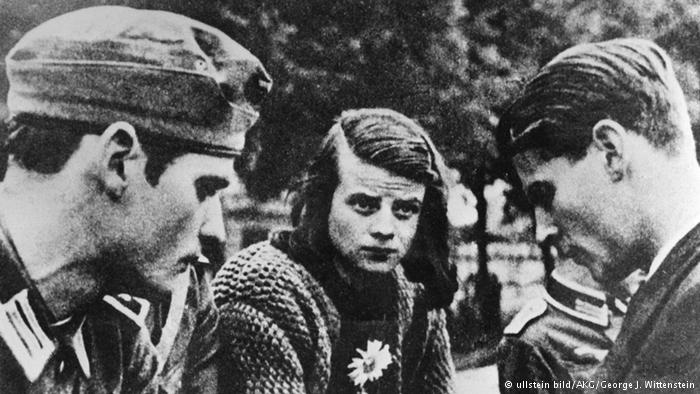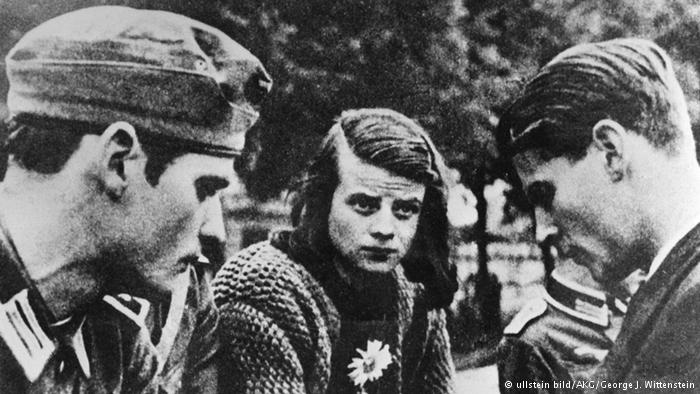
One of the most dramatic movie scenes I have ever watched is the courtroom segment in Sophie Scholl: The Final Days, a German movie with English subtitles that I cannot recommend too highly. The movie revolves around Hans and Sophie Scholl, a brother and sister who were two of the principal members of a German organization called the White Rose.
I first wrote about the White Rose in 1996 in an article entitled “The White Rose: A Lesson in Dissent,” which was later published in an anthology on the Holocaust for high school students. The White Rose is one of the most remarkable stories of courage I have ever encountered. The fact that the organization was composed primarily of college students makes it even more amazing.
In fact, one summer I took my bicycle to Germany where I cycled around Munich. My first stop was the University of Munich, which the White Rose students were attending. A courtyard at the university is composed of brick inlays that have excerpts from the pamphlets that the students were secretly, surreptitiously, and anonymously distributing to the people of Germany.
Why the secrecy and anonymity?
Two reasons.
First, this was 1943, the height of World War II, when German troops were fighting on two fronts — the western front against the British and Americans and the eastern front against the Soviet communists (America’s wartime partner and ally who would, after the war, be converted to America’s [and West Germany’s] enemy).
Second, the pamphlets exhorted the German people to oppose their government and its war machine and even called on them to sabotage armaments plants and war industries. That was a dangerous thing to do — something that Hitler and his national-security establishment would not look kindly upon, especially since the nation was at war and massive numbers of German troops were dying or getting injured or captured on the battlefield every day, not to mention the German civilians who were suffering under continuous allied Allied bombing raids.
Despite their youth, the Scholl siblings, both of whom were Christians, and the other members of the White Rose were well aware of the risks they were taking with their dissent. That’s why their publication and distribution of the pamphlets were conducted in the utmost secrecy.
One day, Sophie made a gigantic mistake. Thinking that no one was around in the early morning at the University of Munich, she dumped a stack of White Rose pamphlets from an upper story into a university courtyard for students to pick up and read once they arrived at school that day. A janitor saw her do it, locked the doors, and called the Gestapo. He considered himself a patriot — and the government considered him a patriot — because he was fulling the government’s request to report on suspicious activity.
Sophie and Hans, along with their best friend Christoph Probst, were immediately put on trial before the People’s Court, which was a special tribunal system that Hitler had set up to try terrorism and treason cases that existed independently of Germany’s regular judicial system. Hitler had established this special tribunal system as part of his war on terrorism after the terrorist attack on the Reichstag. Angry that the regular courts had acquitted some of the suspected terrorists in the Reichstag attack, Hitler wanted to make sure that suspected terrorists were never again released and were instead convicted and punished.
The presiding judge for the White Rose tribunal was Roland Freisler, who was the overall head of the People’s Court. Upon the arrest of the Scholl siblings, Hitler sent him from Berlin to Munich to preside over the White Rose trial. Hitler was fully aware that this was the first time that dissent had broken out publicly over his policies and he wanted to send a message to the rest of Germany: Don’t even think about opposing what your government is doing. We are at war. Support the troops.
Not surprisingly, the trial was held in secret. National security was at stake. When Hans’s and Sophie’s mother tried to enter the courtroom, she was barred. The court guard told her that she should have raised her children better.
As an aside, notice how the Scholl siblings’ “defense” attorney does nothing to defend them at the trial. He is too scared, and he undoubtedly knew that the verdict is preordained anyway. His silence and inaction provides us with a keen insight into why our American ancestors included “the right to effective assistance of counsel” in the Bill of Rights. They understood that the US government was as capable of denying people critically procedural rights as any other regime, and they wanted to make it clear that to do so here in the United States would be illegal under our form of government.
The White Rose trial raises important issues regarding patriotism and war, issues that American citizens themselves have been grappling with during the past 25 years of continuous warfare in Iraq, Syria, Yemen, Pakistan, Somalia, and other parts of the Middle East and Afghanistan.
Freisler’s position was clear: In times of war, it is the duty of the citizen to support the troops and support his government. The time for debate and discussion about whether the country should be at war is over. Once the government goes to war, the nation has to come together to win the war. It’s our team against their team. Citizens who criticize the war effort and refuse to support the troops are contributing to their country’s defeat. They are the antithesis of patriots. They are traitors to their country.
In the courtroom scene, you will see that Freisler is genuinely angry and outraged over what the Scholl siblings have done. In his mind, Hans and Sophie are clearly traitors and must be punished accordingly. It is not difficult to see that he genuinely believes what he’s saying.
The Scholl siblings had a different concept of patriotism. For them, it is the duty of the citizen to make an independent appraisal of their own government and the reasons it is waging war. If the citizen concludes that his government is in the wrong, it is incumbent on him to oppose the government, to stop supporting the troops, and to call on others to do the same. For the Scholl siblings, that’s what patriotism is all about — not a devoted allegiance to the government and its war machine, including during time of war, but rather a willingness to stand against the government and its war machine when it is in the wrong. For them, this was the way to lead Germany out of the darkness of tyranny and into the light of freedom.
Watching the courtroom scene, one is tempted to sympathize with the Scholl siblings. However, the fact is that Freisler’s concept of patriotism, not that of the White Rose, has been the widely accepted one throughout most of history. Throughout the 20th century and into the 21st century, governments in countries all across the globe have spied upon, jailed, ruined, and even killed citizens who have refused to get on their government’s war bandwagon or who have chosen not to support the troops. And governments have done those things with the full support of much of their citizenry.
What position would Americans, including high-school and college students living today, have taken if they were German citizens in the midst of World War II? Would they have supported Freisler, the People’s Court, and the standard view on patriotism? Or would they have supported the White Rose and Hans and Sophie Scholl’s concept of patriotism? What would Americans do if they found themselves in a similar situation today?
If you would like to see part of the courtroom scene in Sophie Scholl: The Final Days, click here and go to 8:30. But, again, I highly recommend watching the entire movie.
Reprinted with permission from the Future of Freedom Foundation.

